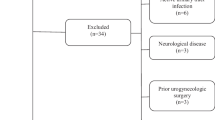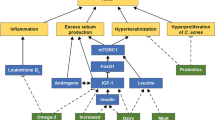Abstract
Chronic prostatitis is a poorly defined condition that is difficult to treat; there are therefore multiple therapies. Although there is a paucity of trials using phytotherapeutic agents, plant extracts have been postulated to have anti-inflammatory effects that might be useful in the treatment of chronic prostatitis. More placebo-controlled trials of longer duration in this condition are needed to ascertain whether there is a significant benefit to the use of phytotherapeutic agents for chronic prostatitis.
Similar content being viewed by others
References and Recommended Reading
Walsh PC, Retick AB, Vaughan ED, et al.: Campbell’s Urology, edn 7. Philadelphia: WB Saunders Co; 1998:624–626.
Rugendorff EW, Weidner W, Ebeling L, et al.: Results of treatment with pollen extract (Cernilton N) in chronic prostatitis and prostatodynia. Br J Urol 1993, 71:433–438. This is the largest study of chronic prostatitis patients treated with phytotherapeutic agent.
Buck AC: Phytotherapy for the prostate. Br J Urol 1996, 78:325–336. This is an excellent overview of phytotherapy for prostate disease.
Shoskes DA, Zeitlin SL, Shahed A, Rajfer J: Quercetin in men with category III chronic prostatitis: a preliminary prospective, double blind, placebo-controlled trial. Urology 1999, 54:960–963. This is the only placebo-controlled prostatitis study with a phytotherapeutic agent.
Shoskes DA: Effect of the bioflavoid Quercetin in patients with longstanding chronic prostatitis. J Am Neutraceut Assoc 1999, 2:18–21.
Lowe FC, Ku JC: Phytotherapy in the treatment of benign prostatic hyperplasia: a critical review. Urology 1996, 48:12–20.
Lowe FC, Fagelman E: Phytotherapy in the treatment of benign prostatic hyperplasia: an update. Urology 1999, 53:671–678. This is the most recent review of phytotherapy for BPH, with critical analysis.
Bach D, Walker H: How important are prostaglandins in the prostate and kidney in man? Urol Int 1982, 37:160–171.
Levschner F: Examination of the influence of B-sitosterine with Ieo B-sitosterine-B-D-glucoside at the carrageenininduced rat paw oedema following oral administration. LPT Rep 1995, 9267.
Rolland P, Martin P, Sermet G, et al.: Human benign prostate hypertrophy: role of prostaglandin E2 and its relationship to bromocriptine therapy. Eur Urol 1981, 7:41–45.
Paubert-Bragnet M, Couss H, Raynaud JP, et al.: Effect of the lipodosterolic extract of Serenoa repens (Permixon) on the ionosphere A23187-stimulated production of leukotriene B (LTB4) from human polymorphonuclear neutrophils [abstract]. Prostaglandinds Leukot Essent Fatty Acids 1997, 57:299–304.
Ragab A, Ragab-Thomas JF, Delhan A, et al.: Effects of Permixon on phospholipase A2 activity and on arachidonic acid metabolism in cultured prostatic cells. In New Trends in BPH Etiopathogenesis: Proceedings of the International Workshop in Urology 1987. Edited by DiSilvero F, Steg A. Canns Row: Acta Medica; 1988:293–296.
Zahradnik HP, Schillifahrt R, Schoening R, et al.: Prostaglandin content in prostate adenoma following treatment with sterol. Fortsch Med 1980, 98:69–72.
Loschern G, Ebeling L: Hemmung der Arachindonsaure-Kaskade durich einen Extrakt ais Roggenpollen. Arzneim Forsh/Drug Res 1991, 41:162–167.
Bruchovsky N: Comparison of the metabolites found in rat prostate following the in vivo administration of 7 natural androgens. Endocrinology 1991, 89:1212–1218.
Carilla E, Roger A, Briley M, et al.: The lipo-sterolic extract of Serenoa repens B: new treatment of prostatic hyperplasia, with anti-androgen effects at two complementary levels. Excerpta Medica 1986, 20:216–223.
Sultan C, Turaya A, Devillier C, et al.: Inhibition if androgen metabolism and binding by a liposteroic extract of Serenoa repens B in a human foreskin fibroblast. J Steroid Biochem Mol Biol 1984, 20:515–519.
Rhodes C, Pruka RL, Berma C, et al.: Comparison of finasteride (Proscar), a 5-a reductase inhibitor, and various commercial plant extracts in in-vivo 5-a reductase inhibition. Prostate 1993, 22:43–51.
Iehle C, Delos S, Guirov O, et al.: Human prostatic steroid 5-a reductase isoforms: a comparative study of selective inhibitors. J Steroid Biochem Mol Biol 1995, 54:273–279.
Stracuh G, Perles P, Vergult G, et al.: Comparison of finasteride (Proscar) and Serenoa repens in the inhibition of 5-a reductase activity in healthy male volunteers. Eur Urol 1994, 26:247–252.
Levin RM, Riffauld JP, Bellamy F, et al.: Protective effect of Tadenan on bladder function secondary to partial outlet obstruction. J Urol 1996, 155:1466–1470.
Levin RM, Riffauld JP, Bellamy F, et al.: Effects of Tadenan pretreatment on bladder physiology and biochemistry following partial outlet obstruction. J Urol 1996, 156:2084–2088.
Buck AC, Rees RM, Ebeling L: Treatment of chronic prostatitis and prostatodynia with pollen extract. Br J Urol 1989, 64:496–499.
Ebeling L: Therapeutic results of defined pollen extract in patients with chronic prostatitis of BPH accompanied by chronic prostatitis. In Therapy of Prostatitis. Edited by Weidner W, Brunner H, Krause W, et al. Munich: Zuckschwerdt-Verlag; 1986:154–160.
Author information
Authors and Affiliations
Rights and permissions
About this article
Cite this article
Lowe, F.C., Fagelman, E. Phytotherapy for chronic prostatitis. Curr Urol Rep 1, 164–166 (2000). https://doi.org/10.1007/s11934-000-0053-x
Issue Date:
DOI: https://doi.org/10.1007/s11934-000-0053-x




